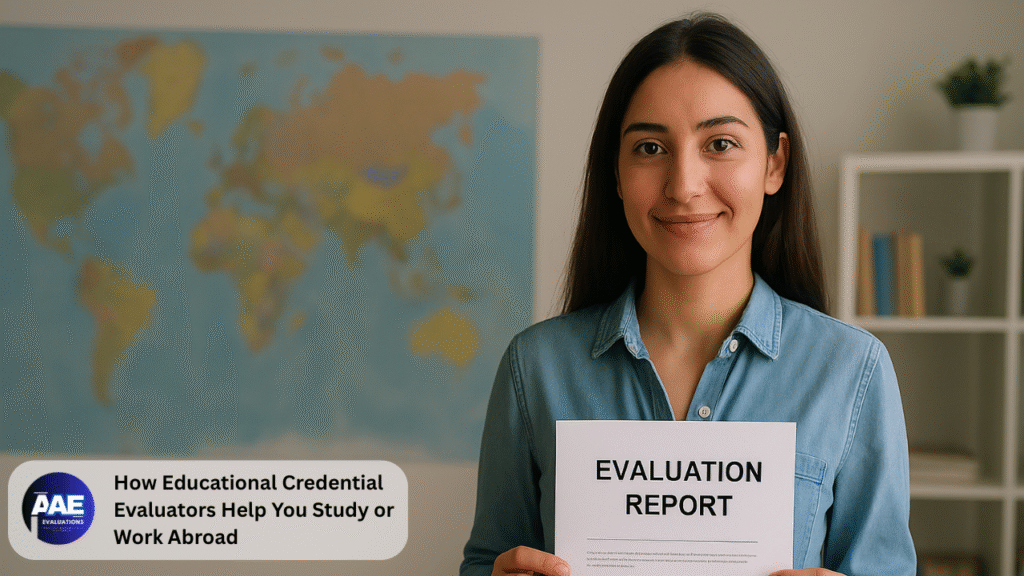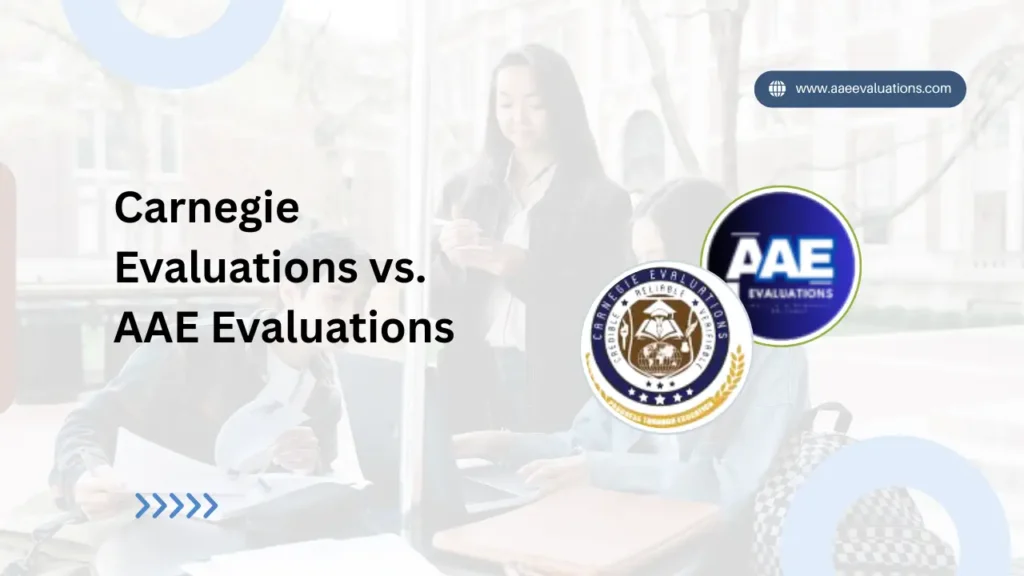How Educational Credential Evaluators Play a Key Role in Studying or Working Abroad
In today’s globalized world, international education and career opportunities are more accessible than ever before. Students and professionals across the globe aspire to study in prestigious universities or secure rewarding jobs in countries such as the United States, Canada, the UK, or Australia. However, one of the biggest challenges they face is ensuring that their academic qualifications are properly recognized abroad. This is where Educational Credential Evaluators play a crucial role. These experts help verify and translate foreign academic achievements into terms that universities, employers, and immigration authorities can understand and trust.
Every country has its own education system, grading scale, and degree standards. A bachelor’s degree from one country may not automatically be considered equivalent to a bachelor’s degree elsewhere. This difference often causes confusion among universities, employers, and immigration authorities.
That’s where Educational Credential Evaluators come in. These are professionals or accredited organizations that assess foreign academic credentials to determine their equivalency in another country’s education system. Their detailed reports ensure that your qualifications are fairly recognized, allowing you to pursue higher education, professional licensing, or employment opportunities abroad.
Without proper credential evaluation, your degree might not be understood or worse, it could be rejected by your target institution or employer. Hence, working with the right Credential Evaluation Service is one of the most important steps toward studying or working overseas.
In this comprehensive guide, we’ll take you through each step of how Educational Credential Evaluators help you achieve your international goals—from document submission to final evaluation and how you can make the most of the process.
What Are Educational Credential Evaluators?
Educational Credential Evaluators are professionals or authorized organizations that analyze and compare foreign academic records to the standards of the destination country. Their main goal is to determine what your degree, diploma, or transcript is equivalent to in that country.
For example, if you earned a bachelor’s degree in one country and want to pursue a master’s degree in another, an evaluator will determine how your degree compares to the education system of your destination. They’ll check whether it’s equivalent to a local bachelor’s degree and ensure that your academic achievements are properly understood.
These evaluators use standardized methods, authentic databases, and international benchmarks to assess:
- The legitimacy of your institution
- The level and duration of your education
- The grading system used
- The content and credit hours of your courses
Why Credential Evaluation Is Important for Studying or Working Abroad
Before universities or employers accept your application, they need to verify that your education meets their standards. Credential evaluation serves as the bridge that connects international qualifications to local understanding.
Here’s why it’s essential:
- University Admissions: Many institutions abroad require a credential evaluation report to determine if your degree is equivalent to their entry requirements.
- Employment Opportunities: Employers often use credential evaluations to verify that you meet the qualifications for a position.
- Professional Licensing: Certain fields like engineering, nursing, or accounting require evaluation reports before issuing licenses.
- Immigration Purposes: Credential evaluation reports are frequently required for visa and immigration petitions.
By working with Educational Credential Evaluators, you ensure your academic records are properly validated, increasing your chances of acceptance and recognition.
How to Choose the Right Credential Evaluation Service
Choosing the right Credential Evaluation Service can make a huge difference in how smoothly the process goes. Here’s what to consider:
- Accreditation: Make sure the service is a member of recognized evaluation associations.
- Recognition: Check if the evaluator’s reports are accepted by your target institution or employer.
- Type of Report: Some need a general report, while others require a detailed course-by-course evaluation.
- Processing Time: Depending on urgency, select a service that matches your deadlines.
- Cost: Prices vary based on report type and service speed, so compare before choosing.
Collecting and Preparing Your Academic Documents
Before contacting Educational Credential Evaluators, gather all the necessary academic materials. This includes:
- Degree certificates and diplomas
- Official transcripts from your institution
- Mark sheets or course details
- English translations (if your documents are in another language)
Ensure all documents are authentic and properly sealed. Some evaluators require direct verification from your university, while others accept attested copies. Preparing your documents in advance helps avoid delays once the evaluation begins.
Submitting Documents to Educational Credential Evaluators
After you have your documents ready, you’ll need to submit them to your chosen Credential Evaluation Service. Most evaluators now offer convenient online portals where you can upload documents and track progress in real-time.
Steps usually include:
- Creating an online account
- Selecting the report type (general or course-by-course)
- Uploading your documents or mailing sealed copies
- Paying the evaluation fee
- Waiting for confirmation that your documents were received
Some services also contact your educational institution directly to verify authenticity.
The Evaluation Process Explained
Once your documents are received, Educational Credential Evaluators begin the actual assessment process.
This includes:
- Verification: Checking if your school or university is accredited.
- Comparison: Mapping your courses, grades, and credits against local education standards.
- Conversion: Translating grades into the grading scale of your destination country.
- Equivalency Analysis: Determining the local equivalent of your degree or diploma.
The process generally takes 2–4 weeks, depending on the complexity of your case and the evaluator’s workload.
Understanding Your Evaluation Report
When the evaluation is completed, you’ll receive an official report from your Credential Evaluation Service. The report typically includes:
- The name of your institution and its accreditation status
- Your degree title and field of study
- The equivalent level in the destination country
- Converted GPA or credit hours
- Additional notes or observations
This report acts as your verified academic identity in the new country—clear, professional, and universally understood.
How to Use Your Credential Evaluation Report
Your evaluation report can be used for multiple purposes:
- University Applications: Attach it to your admission documents.
- Job Applications: Present it as proof of educational qualification.
- Immigration: Submit it with your visa or green card application.
- Licensing: Required by boards like nursing, teaching, or engineering authorities.
Most evaluators also allow you to send official electronic copies directly to institutions—saving time and effort.
Benefits of Using Professional Educational Credential Evaluators
Working with professional Educational Credential Evaluators offers several key advantages:
- Accuracy and Credibility – Evaluators use verified data and international benchmarks.
- Wider Acceptance – Reports are recognized by institutions and employers worldwide.
- Time Efficiency – They streamline the process, saving weeks of manual effort.
- Fraud Prevention – Authentic verification ensures the legitimacy of documents.
- Peace of Mind – You can focus on your application knowing your education is properly represented.
Common Mistakes to Avoid During Credential Evaluation
Many applicants make errors that can delay or even derail the process. Avoid these common mistakes:
- Submitting incomplete or unofficial documents
- Choosing an unrecognized evaluation agency
- Ignoring specific report requirements from the university
- Missing document translation requirements
- Waiting until the last minute to apply
By double-checking each step, you’ll save valuable time and increase your chances of success.
Tips for a Smooth Credential Evaluation Process
Here are some quick tips to ensure a smooth and successful evaluation experience:
- Always confirm that your Credential Evaluation Service is recognized.
- Translate non-English documents with certified translators only.
- Track your application status online.
- Request multiple copies of your report for future use.
- Keep all communication records with your evaluator.
Proper planning can make your entire study or work abroad journey more seamless.
AAE Evaluations: Helping You Simplify the Credential Evaluation Process
If you’re planning to study, work, or immigrate abroad, having your educational documents properly evaluated is essential. AAE Evaluations provides professional credential evaluation services that help students, professionals, and immigrants ensure their academic achievements are accurately recognized in the U.S. and other countries.
AAE Evaluations follows a detailed and transparent process—from document verification to final evaluation making it easy for applicants to meet university, employment, or immigration requirements without confusion.
Frequently Asked Questions (FAQs)
Q1: How long does the evaluation process take?
Most Educational Credential Evaluators complete the process within 2–4 weeks. Expedited services may be available for an additional fee.
Q2: Do all universities require credential evaluation?
Not all, but most foreign institutions do—especially in countries like the U.S. and Canada.
Q3: What if my school is not accredited?
If your institution isn’t recognized, your evaluation may result in limited or no equivalency.
Q4: Can I reuse my evaluation report for different purposes?
Yes, most reports are valid for multiple uses and can be sent electronically to multiple organizations.
Conclusion
Applying to study or work abroad is a major life step and one that demands accuracy and authenticity. Educational Credential Evaluators play a key role in ensuring that your qualifications are properly recognized across borders. Their evaluations eliminate confusion, standardize differences in education systems, and give your academic profile the credibility it deserves.
Choosing a trusted Credential Evaluation Service can make all the difference. Whether your goal is university admission, career advancement, or immigration, the right evaluation will help you stand out as a verified and reliable candidate.
So, before you take your next big leap abroad, make sure your credentials are ready for global recognition with the expert support of professional Educational Credential Evaluators.



